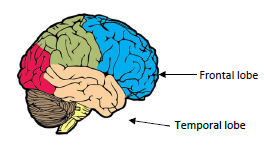Some people with MND, but without a diagnosis of dementia, will experience changes to their thinking and behaviour. This is known as cognitive change and it is believed to affect around 50% of people diagnosed with MND.
These changes could be things like finding it difficult to concentrate, struggling to find the right word in a conversation and changes in how you express your emotions.
Most people experience relatively mild changes. However, a small number of people (5-15%) will have more significant changes and may receive a diagnosis of ‘motor neurone disease with frontotemporal dementia' or MND/FTD.

Frontotemporal dementia (FTD) affects the front and side lobes of the brain — the parts of the brain that control mood, social behaviour, attention, judgement and self-control. This dual diagnosis can occasionally be due to a genetic link that runs in families. Some members of the family may have MND without FTD, or vice versa. These inherited conditions are caused by a fault in a gene - called a gene mutation - C9orf72 is a known MND-related gene mutation that also has links to FTD.
Examples of cognitive and behavioral changes
Cognition
Changes to cognition relates to intellectual abilities and thinking skills, and may include:
- Difficulty paying attention and concentrating.
- Changes in memory and the ability to recall information.
- Changes in the ability to learn new things, like a new driving route or cooking recipe.
- Difficultly adapting to change in routine.
- Changes in social cognition skills and difficultly with emotional recognition or interacting in a social environment.
Language
Sometimes changes in cognition can cause changes to language and speech, including:
- Difficulty finding the right word to say.
- Requiring more effort and time to speak.
- Unusual speech patterns, using odd words or repeating words.
- Difficulty naming objects.
Behaviour
Changes in behaviour may include:
- Feeling apathetic or losing interest in daily tasks or things otherwise enjoyed.
- Being impulsive or adopting repetitive behaviours.
- Changes to food preferences, like eating in a particular way or only eating one type of food.
Emotional lability
Also known as pseudobulbar palsy/affect, emotional lability is involuntary emotional expression and may be sudden and uncontrolled laughing or crying often without an emotional trigger.
Source
Cognition, thinking and behaviour (c) MND Australia - Last updated July 2021
Cognitive and behaviour change in MND (c) MND Australia - Last updated November 2020

